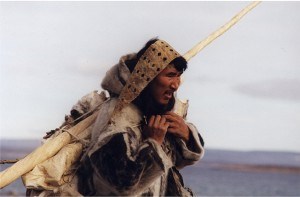
An unnamed and wholly stop-motion animated hoop dancer spins and gyrates through a field, picking up hoops and swinging them through the air one by one in a demonstration of the elegant and spiritually significant Indigenous art form.
Saskatoon filmmaker Melanie Jackson’s 2009 piece Dancers of the Grass is one of more than 250 Indigenous-made films that has been made available to the public by the National Film Board (NFB) since the beginning of the year.
Just two minutes long, the most recent of 14 Jackson works listed on the NFB website is a good representation of what Michelle van Beusekom, the NFB’s executive director of English-language production, had in mind when she suggested turning a spotlight on these underexposed homegrown works of art and screening them in communities across Canada, including Jasper.
“Screenings are being organized across the country,” she explained. “We’re making it possible for people to organize their own community screening. It could be something small, a living room screening with neighbours and friends, or it could be working with a venue like a public library to organize a bigger event.”
Such a thing will occur at Habitat for the Arts on National Aboriginal Day, June 21. Two distinct sets of Indigenous-made shorts will be screened at 2 p.m. and 7 p.m. respectively, free of charge. Each program runs for about 98 minutes.
New releases such as The Road Forward by Marie Clements, Birth of a Family by Tasha Hubbard and We Can’t Make the Same Mistake Twice by Alanis Obomsawin take their place alongside essential NFB films like Finding Dawn by Christine Welsh, Foster Child by Gil Cardinal, and Atanarjuat The Fast Runner by Zacharias Kunuk.
A list of the films that will be screened in Jasper is available at nfb.ca/wideawake. There are more than 250 pieces.
“It’s a good microcosm of the collection in general,” van Beusekom said, noting the oldest piece in the group was produced by the NFB in 1968. “They’re generating a lot of interest.”
More than 200 screenings have already taken place in 2017.
“If you visit the website, more and more screenings are popping up all the time as different individuals decide to jump in and organize something,” she said. “When we hear back about the kinds of conversations the films start, because that’s what it’s all about, getting people to look at things from a slightly different perspective and to feel that tap on the shoulder - ‘oh, I never thought about it that way before’ - and to spark discussion and dialogue and to bridge misunderstandings, it’s very encouraging.”
The name for the collection, Wide Awake, comes from an Anishinaabe word, Aabiziingwashi, which means “wide awake” or “unable to sleep.”
“The idea is that these films speak some of the truths that have been hidden, or not as available to mainstream Canada.”
Craig Gilbert
[email protected]
